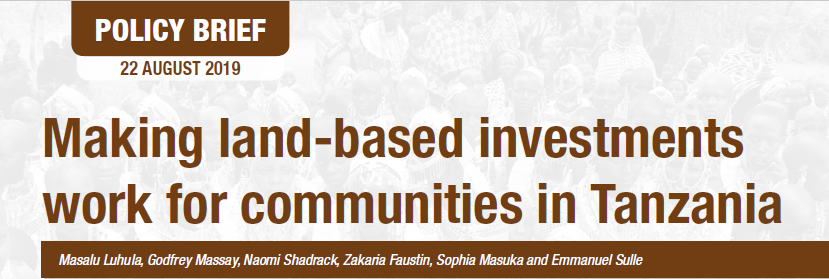Land allocation as a challenge in villages in Tanzania: observations from a trainer
By Masalu Elias Luhula - TNRF | September, 2015
Introduction
Administration and Management of land at village level is well provided within the Village Land Act, 1999. The Act gives mandate of administration and Management of village land to two Authorities, the Village Council and the Village Assembly.
The Village Council is the authority entrusted with management and administration of village land on behalf of villagers in the village. The Village Council has the power to allocate land available in the village land. Allocation of land out of the village land affects interest in land of villagers and the village as a whole. Therefore the law requires that, the village council get approval of the Village Assembly. In my view, the law considered the true spirit of land as a public property and the legal principle of public interest in land matters.
This is trainer’s experience from field study. The training was conducted in Pawaga division in Iringa District, Iringa Region from April until August this year (2015) by the Tanzania Natural Resource Forum (TNRF) with financial support from CARE – Denmark under the Ardhi Yetu Project. During the training, I discovered a number of challenges that face the administration of land at village level. In this brief that intends to inform the public and other interested stakeholders of land protection and proper utilization of land resource, I wish to share my observation as land rights trainer on land allocation in villages as the great challenge in management of village land.
Land allocation as a challenge in villages
It is the fundamental principal of law that no village land can be allocated or dealt in any how with the village council without prior approval of the village assembly. Despite the fact that, land laws became operational since 2001, the village councils in different villages continued to allocate land without approval of the village assembly contrary to the law.
It was testified by villagers in Isele village in Iringa district where the village council decided to allocate village land to different people in the village in early August, 2015 without convening a Village Assembly to approve that action. Also in 2013 at Magombwe village in Iringa District without consent of the villagers, the Village Council together with some elders agreed with other village leaders (Mkuyuni village) that part of Magombwe village land to be taken and form part of Mkuyuni village. Another example is from Magombwe village in which the village council allocated land that belongs to one primary school to a villager. All this occasions have been sources of conflicts.
Conclusion
All these acts are done mostly in ignorance of the law. The certificate of village land gives power to the Village Council to manage village land. However the legal requirement that they manage as trustees of the villagers is unclear to them. This calls for more training and public awareness campaign on land rights in villagers. It is more than a decade now since the land laws became operational. Nevertheless, seven villages I trained in Pawaga division Iringa district proved not to know whether the village council is subjective to the villagers through the village assembly nor has to act as a trustee to the villagers who are beneficiaries. It is my advice that the government put emphasis on encouraging dissemination of information on administration of land in villages either directly or give support to civil society organization which have dedicated their time for providing training on land related matters to local communities. If this is adhered to, land allocation in villages won’t be a challenge rather a developmental strategy.

